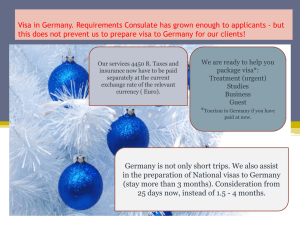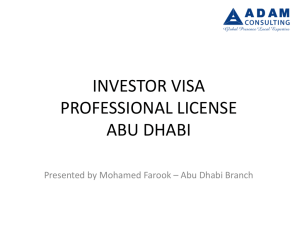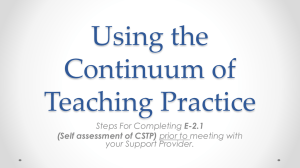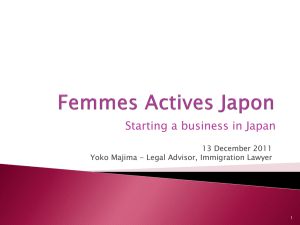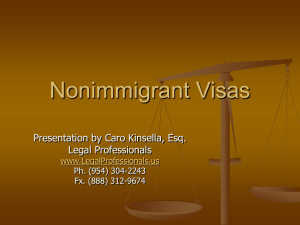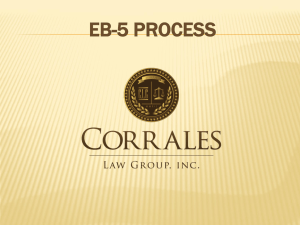The E-2 Visa and Foreign Franchisees
advertisement
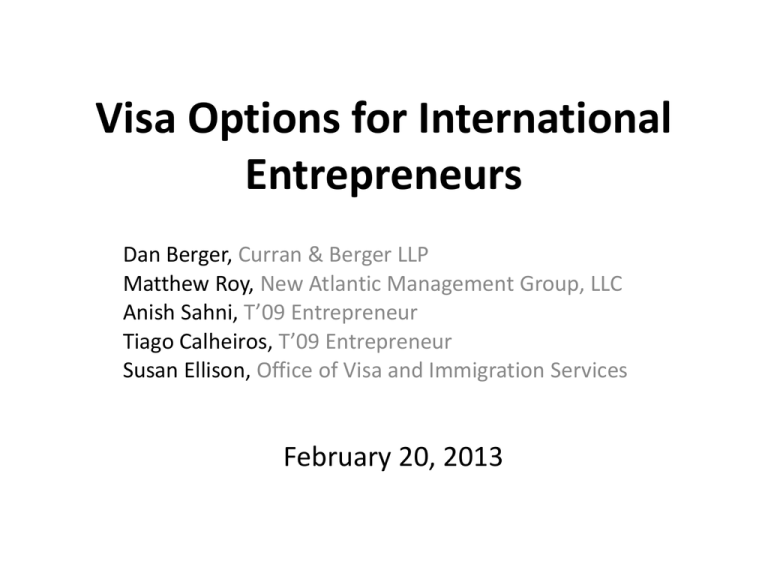
Visa Options for International Entrepreneurs Dan Berger, Curran & Berger LLP Matthew Roy, New Atlantic Management Group, LLC Anish Sahni, T’09 Entrepreneur Tiago Calheiros, T’09 Entrepreneur Susan Ellison, Office of Visa and Immigration Services February 20, 2013 2013 will be an interesting year USCIS is at least paying lip service http://www.uscis.gov/portal/site/uscis/eir To follow developments in Congress www.competeamerica.org The Internet A tool for you, and for USCIS unauthorized employment - Google - LinkedIn - Facebook - Online articles Make sure your web presence only has authorized work! Narrow down the list Step 1: List all visa options available to you Step 2: What are your long-term goals? Step 3: Weigh the advantages and disadvantages of the different types of visas The Big Questions •A. Can I start a US business? •B. Can I stay in the US? •C. Can I pay myself? •D. Can I hire a foreign employee? Can I Start a US Business? • Yes, visa status is not required to be a passive owner, as in buying stock or owning real estate. • Consult with corporate attorney or accountant regarding legal entity Can I Stay In The US For My Business? • Need legal status to remain in the US. • During F-1 status, must have work authorization to be employed at the business • OPT is most flexible time of F-1 status • After OPT, need to find another status to remain in US for the business http://curranberger.com/content/view/313/119/ Can I Pay Myself? • Only if authorized by USCIS! • Keep up a series of temporary visas until an opportunity for permanent residence arises Key Visa Types Treaty Investor (E-2) visa program • The investment and the business enterprise must satisfy several criteria, BUT • Consular Officers should be flexible, and consider the spirit of the program • We believe the E-2 visa can be used broadly to enable entrepreneurs of many types Treaty Countries If the principal employer is not an individual, it must be an enterprise or organization at least 50% owned by persons who have the nationality of a treaty country For more information on treaty counties, please visit: http://travel.state.gov/visa/ fees/fees_3726.html Basic E-2 Visa Requirements • Nationality • Investment must be substantial • Real, operating enterprise • Investor must have control of the funds, and investment must be “at-risk” • Investor must have controlling interest, and intend to develop and direct the enterprise • Enterprise must be more than marginal E-2 requirements are NOT formulaic – No minimum investment – No minimum number of employees – No limits on the size or type of business – Great deal of flexibility on HOW the investment funds are deployed • At the same time, some of the requirements can be very restrictive: – No flexibility on the nationality of the business, investors, and employees – No flexibility on the ownership % and the role of the investor applicant in the business Building a Strong E-2 Case • A client with these three things can potentially build a strong E-2 case: 1. An idea and the entrepreneurial drive to execute 2. Access to a modest amount of capital 3. Nationality of an E-2 Treaty country • If you understand how the rules can be applied, you can advise your client on how to develop a strong E-2 case. • You can also consider cases that you might have otherwise discouraged or avoided. Conclusions • Tell a compelling story – It is as much a sales pitch, as it is a legal case; convey the entrepreneurial spirit of the investor and the positive economic impact (local, regional or national) • Presentation is important - The business plan and analytical cover letter must be concise, clear, organized, and easy to read (it is a LOT of information for the adjudicator to process…don’t make it any harder for them) • Encourage your client to do things right, in spite of the extra effort required E-1 visa – Treaty Trader • Much less used than E-2 • For company that has substantial trade with the owner’s home country – goods or services Other Temporary Visas • H-1B – salaried position related to degree, heavily regulated • L-1 - transfer from employment by affiliated company abroad • O-1 – based on “extraordinary ability” in business or the subject of the business • Free Trade Agreement – Canada, Mexico, Chile, Singapore, Australia – more to come Spouses • E-1, E-2,E-3, L-1, and J-1 status allow spouses to work in any field • Spouse can also pursue permanent residence Green Card Categories Self-petitions National Interest Waiver Extraordinary Ability Immigrant Investor (EB5) Green Card Categories, continued Employer sponsored Labor Certification – for more established business not owned by employee Multinational Manager – transfer from abroad Outstanding Researcher Green Card Categories, continued Non-Employment Based Categories Family sponsored Asylum Diversity Lottery – October Questions and Discussion
